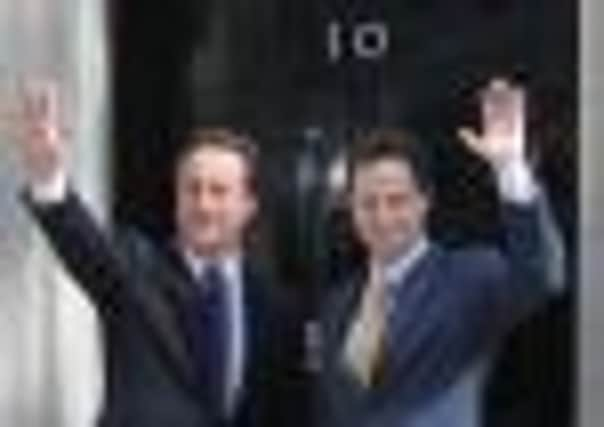Leaders: New direction and ideas needed by drifting coalition


Failure to articulate a strategy for economic recovery is a glaring weakness. But it is indecision elsewhere that reinforces the impression of an administration that has lost its moorings. On issues such as the Heathrow airport expansion, for example, there is continuing confusion.
Last week, the Prime Minister was challenged by a senior backbencher to show whether he is “a man or a mouse” over the issue of a third runway. And as if that was not enough, Nick Clegg, the Liberal Democrat leader and Deputy Prime Minister, took the opportunity to air his support for higher taxes for the well-off, those to be on top of a so-called mansion tax.
Advertisement
Hide AdAdvertisement
Hide AdThese notions are so alien to his larger coalition partner that there is no realistic prospect of them ever proceeding into legislation. This Mr Clegg well knows. His call was widely seen as little more than a ploy to mollify the Left of his party ahead of the party conference. This may be good politics, but it is not good government.
And even within the Liberal Democrats there are now public grumblings about this meandering and incoherent style of leadership. It is easy for former leader Sir Menzies Campbell to brush this aside as mutterings only to be expected in the run-up to a party conference. But this does not address the greater concern that they may be true.
However, it is over the economy that the coalition is most vulnerable. Last week brought sharp criticism from the heads of the Confederation of British Industry and the British Chambers of Commerce that the government has not been nearly robust enough is pushing through measures to lighten the regulatory burden, simplify planning and promote enterprise.
Now from Mr Cameron and Mr Osborne comes a pledge to tackle planning problems – only now.
No clear pathway to recovery has been spelt out. And on the central mission of the coalition – debt and deficit reduction – there has been a signal failure. The deficit target is on course to be missed and net debt continues to increase. This is an administration heading towards failure on all counts that matter.
The biggest concern is the absence of bold new policies that would offer some prospect of raising the economy out of the doldrums. But where is the big idea? We need to hear something, and soon. The government’s credibility is shrinking, and dithering over Heathrow does nothing to aid confidence.
There now talk of a Cabinet reshuffle. There is a case for bringing in fresh talent – Lib Dem David Laws, for example, at the Treasury. But different pegs in the same holes will make little difference. Any reshuffle needs to be accompanied by a clear statement of new ideas and direction.
Improved prescription for GP surgeries
For most people in reasonable health, contact with their GP is their main experience of the National Health Service. This makes it all the more important to the standing of the NHS that attention is paid to the relationship between patient and GP.
Advertisement
Hide AdAdvertisement
Hide AdHowever, as Reform Scotland notes in a new policy paper today, the top five negatively-rated issues in a Scottish Government survey were all to do with how patients accessed services. It is here the paper’s authors believe improvements can be made. More could be done to improve access, and there would seem to be some practical and worthwhile value in the proposals put forward.
For example, it highlights the wide variation in how GP services can be accessed, depending on where you live: whether the practice is open in the evening or at weekends, whether it allows you to book appointments or order repeat prescriptions online, or indeed whether the practice even has a website.
This matters because GPs are the gatekeepers to the NHS. The paper claims the current system is effectively a lottery as patients have very little choice over the GP practice with which they can register. GPs would counter that there is considerable choice when patients sign up to a particular practice. But some patients may have found switching GPs not so straightforward.
Reform Scotland would like to see larger catchment areas so that there are more surgeries from which to choose. And it would like more and better information to be provided to patients. Its championing of this point may well have been reinforced by the difficulty the authors had in obtaining information from the NHS when researching this paper.